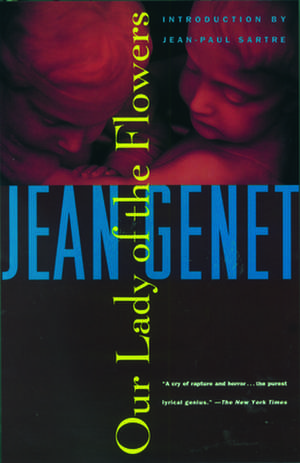Our Lady of the Flowers: Genet, Jean
Autor Jean Genet Jean-Paul Sartre Traducere de Bernard Frechtmanen Limba Engleză Paperback – 31 dec 1993
'Our Lady of the Flowers', which is often considered to be Genet's masterpiece, was written entirely in the solitude of a prison cell. the exceptional value of the work lies in its ambiguity.
| Toate formatele și edițiile | Preț | Express |
|---|---|---|
| Paperback (2) | 77.01 lei 38-44 zile | |
| Grove Atlantic – 31 dec 1993 | 97.31 lei 3-5 săpt. | |
| Faber & Faber – apr 2015 | 77.01 lei 38-44 zile |
Preț: 97.31 lei
Nou
Puncte Express: 146
Preț estimativ în valută:
18.62€ • 19.37$ • 15.37£
18.62€ • 19.37$ • 15.37£
Carte disponibilă
Livrare economică 25 martie-08 aprilie
Preluare comenzi: 021 569.72.76
Specificații
ISBN-13: 9780802130136
ISBN-10: 0802130135
Pagini: 272
Dimensiuni: 138 x 210 x 22 mm
Greutate: 0.37 kg
Ediția:Reissue
Editura: Grove Atlantic
Seria Genet, Jean
ISBN-10: 0802130135
Pagini: 272
Dimensiuni: 138 x 210 x 22 mm
Greutate: 0.37 kg
Ediția:Reissue
Editura: Grove Atlantic
Seria Genet, Jean
Notă biografică
Sartre was born in Paris, France. He had a doctorate in philosophy.
Textul de pe ultima copertă
'Our Lady of the Flowers', which is often considered to be Genet's masterpiece, was written entirely in the solitude of a prison cell. the exceptional value of the work lies in its ambiguity.
Descriere
Jean Genet's first, and arguably greatest, novel was written while he was in prison. As Sartre recounts in his introduction, Genet penned this work on the brown paper which inmates were supposed to use to fold bags as a form of occupational therapy. The masterpiece he managed to produce under those difficult conditions is a lyrical portrait of the criminal underground of Paris and the thieves, murderers and pimps who occupied it. Genet approached this world through his protagonist, Divine, a male transvestite prostitute. In the world of Our Lady of the Flowers, moral conventions are turned on their head. Sinners are portrayed as saints and when evil is not celebrated outright, it is at least viewed with a benign indifference. Whether one finds Genet's work shocking or thrilling, the novel remains almost as revolutionary today as when it was first published in 1943 in a limited edition, thanks to the help of one its earliest admirers, Jean Cocteau.



















